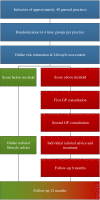Design of the INTEGRATE study: effectiveness and cost-effectiveness of a cardiometabolic risk assessment and treatment program integrated in primary care
- PMID: 24884779
- PMCID: PMC4022539
- DOI: 10.1186/1471-2296-15-90
Design of the INTEGRATE study: effectiveness and cost-effectiveness of a cardiometabolic risk assessment and treatment program integrated in primary care
Erratum in
-
Erratum to: Design of the INTEGRATE study: effectiveness and cost-effectiveness of a cardiometabolic risk assessment and treatment program integrated in primary care.BMC Fam Pract. 2016 Apr 6;17:42. doi: 10.1186/s12875-016-0438-7. BMC Fam Pract. 2016. PMID: 27052829 Free PMC article. No abstract available.
Abstract
Background: The increasing prevalence of cardiometabolic disease (CMD) in combination with an ageing population is a major public health problem. Early detection and management of individuals at risk for CMD is required to prevent future health problems with associated costs. General practice is the optimal health care setting to accomplish this goal. Prevention programs for identification and treatment of patients with an increased risk for CMD in primary care have been proven feasible. However, the effectiveness and cost-effectiveness have yet to be demonstrated. The 'Personalized Prevention Approach for CardioMetabolic Risk' (PPA CMR) is such a prevention program. The objective of the INTEGRATE study is to investigate the effectiveness and cost-effectiveness of PPA CMR, as well as to establish determinants for participation and compliance.
Methods: The INTEGRATE study is designed as a stepped-wedge randomized controlled trial with a waiting list control group. In approximately 40 general practices, all enlisted patients without CMD aged 45-70 years, are invited to participate in PPA CMR. After an online risk estimation, patients with a score above risk threshold are invited to the GP for additional measurements, detailed risk profiling and tailored treatment of risk factors through medication and/or lifestyle counseling. At baseline and after twelve months of follow-up lifestyle, health and work status of all participants are established with online questionnaires. Additionally after twelve months, we will determine health care utilization, costs of PPA CMR and compliance. Primary endpoints are the number of newly detected patients with CMD and changes in individual risk factors between the intervention and waiting list control group. Medical data will be extracted from the GPs' electronic medical records. In order to assess factors related to participation, we will send questionnaires to non-participants and assess characteristics of participating practices. For all participants, additional demographic characteristics will be available through Statistics Netherlands.
Discussion: The INTEGRATE study will provide insight into the effectiveness and cost-effectiveness of PPA CMR as well as determinants for participation and compliance, which represents essential information to guide further large-scale implementation of primary prevention programs for CMD.
Trial registration number: NTR4277, The Netherlands National Trial Register, 26-11-2013.
Figures
Similar articles
-
Feasibility and success rates of response enhancing strategies in a stepwise prevention program for cardiometabolic diseases in primary care.BMC Fam Pract. 2020 Nov 6;21(1):228. doi: 10.1186/s12875-020-01293-9. BMC Fam Pract. 2020. PMID: 33158419 Free PMC article. Clinical Trial.
-
Cost-effectiveness of a stepwise cardiometabolic disease prevention program: results of a randomized controlled trial in primary care.BMC Med. 2021 Mar 11;19(1):57. doi: 10.1186/s12916-021-01933-6. BMC Med. 2021. PMID: 33691699 Free PMC article. Clinical Trial.
-
Effectiveness of a stepwise cardiometabolic disease prevention program: Results of a randomized controlled trial in primary care.Prev Med. 2020 Mar;132:105984. doi: 10.1016/j.ypmed.2020.105984. Epub 2020 Jan 16. Prev Med. 2020. PMID: 31954837 Clinical Trial.
-
Personalized prevention approach with use of a web-based cardiovascular risk assessment with tailored lifestyle follow-up in primary care practice--a pilot study.Eur J Prev Cardiol. 2016 Mar;23(5):544-51. doi: 10.1177/2047487315591441. Epub 2015 Jun 16. Eur J Prev Cardiol. 2016. PMID: 26080811 Review.
-
Managing cardiometabolic risk in primary care: summary of the 2011 consensus statement.Can Fam Physician. 2012 Apr;58(4):389-93, e196-201. Can Fam Physician. 2012. PMID: 22611605 Free PMC article. Review. No abstract available.
Cited by
-
Implementation of a stepped-wedge cluster randomized design in routine public health practice: design and application for a tuberculosis (TB) household contact study in a high burden area of Lima, Peru.BMC Public Health. 2015 Jun 26;15:587. doi: 10.1186/s12889-015-1883-2. BMC Public Health. 2015. PMID: 26109173 Free PMC article. Clinical Trial.
-
Implementation of selective prevention for cardiometabolic diseases; are Dutch general practices adequately prepared?Scand J Prim Health Care. 2018 Mar;36(1):20-27. doi: 10.1080/02813432.2018.1426151. Epub 2018 Jan 22. Scand J Prim Health Care. 2018. PMID: 29357728 Free PMC article.
-
Feasibility and success rates of response enhancing strategies in a stepwise prevention program for cardiometabolic diseases in primary care.BMC Fam Pract. 2020 Nov 6;21(1):228. doi: 10.1186/s12875-020-01293-9. BMC Fam Pract. 2020. PMID: 33158419 Free PMC article. Clinical Trial.
-
Stepped wedge cluster randomised trials: a review of the statistical methodology used and available.BMC Med Res Methodol. 2016 Jun 6;16:69. doi: 10.1186/s12874-016-0176-5. BMC Med Res Methodol. 2016. PMID: 27267471 Free PMC article. Review.
-
Exploring targeted preventive health check interventions - a realist synthesis.BMC Public Health. 2023 Oct 5;23(1):1928. doi: 10.1186/s12889-023-16861-8. BMC Public Health. 2023. PMID: 37798691 Free PMC article. Review.
References
-
- Van der Lucht F, Polder J. Van Gezond Naar Beter. Volksgezondheid Toekomst Verkenning 2010. Bilthoven: Rijksinstituut voor Volksgezondheid en Milieu; 2010.
-
- King H, Aubert R, Herman W. Prevalence, numerical estimates, and projections. Diabetes Care. 2000;21:1414–1431. - PubMed
Publication types
MeSH terms
Associated data
LinkOut - more resources
Full Text Sources
Other Literature Sources
Medical



